Like a rare gem hidden in the depths of a treasure chest, the Ibizan Hound dog breed holds a wealth of information and captivating characteristics waiting to be discovered. With a rich history dating back over 2,000 years, these elegant creatures from the Balearic Islands of Spain have captured the hearts of many.
From their slender build to their affectionate nature, there is much to explore and unravel about these enchanting canines. But what makes them truly unique? What secrets lie beneath their graceful exterior?
In the following discussion, we will delve into the world of the Ibizan Hound, shedding light on their origins, appearance, temperament, and so much more. Prepare to embark on a journey of discovery, where every word unravels a new layer of fascination.
Key Takeaways
- The Ibizan Hound is an ancient breed originating from the Balearic Islands of Spain and is known for its elegant and slender build.
- They are gentle, affectionate, and loyal dogs, but can be independent and stubborn at times.
- Ibizan Hounds are high-energy dogs that require plenty of exercise and may not be well-suited for apartment living.
- While generally healthy, they are prone to certain health conditions such as hip dysplasia, eye problems, and allergies.
Origin and History
The origin and history of the Ibizan Hound can be traced back to the Balearic Islands of Spain, where it has been preserved as one of the oldest dog breeds for over 2,000 years.
These medium-sized dogs have a slender and elegant build, standing between 23.5 to 27.5 inches tall for males and 22.5 to 26 inches tall for females. They weigh around 45 to 50 pounds for males and 40 to 45 pounds for females. Ibizan Hounds have a short and smooth coat that can be red, white, or a combination of both.
They're known for their gentle, affectionate, and loyal temperament. Although they're intelligent and easy to train, they can also be independent and stubborn at times. These dogs aren't good guard dogs as they're friendly with strangers.
Ibizan Hounds are high-energy dogs that need plenty of exercise, including running, playing, and swimming. They may not be well-suited for apartment living and require a yard or large area to play in.
In terms of health, they're generally healthy but may be prone to conditions such as hip dysplasia, eye problems, and allergies. Their lifespan ranges from 11 to 14 years.
Appearance and Size
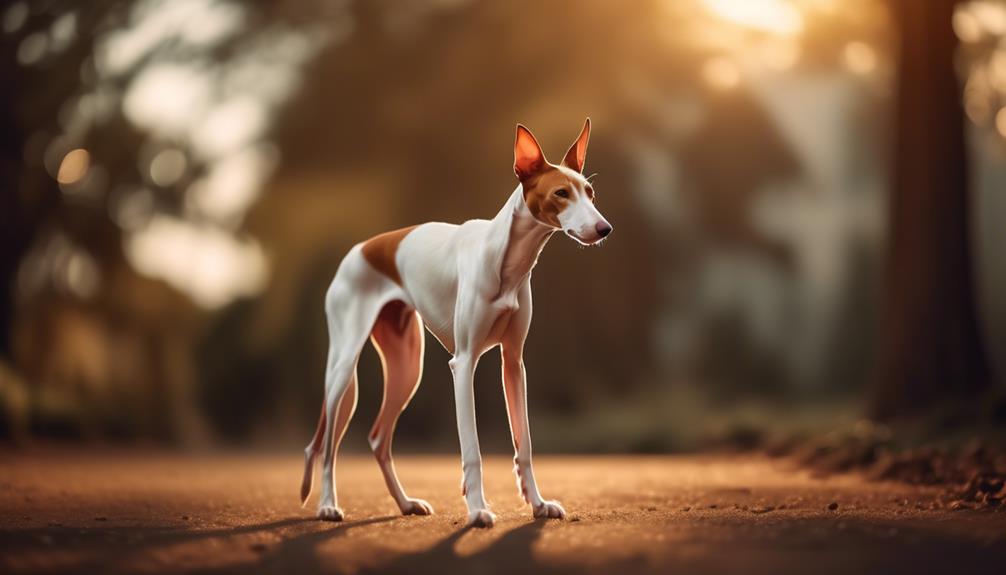
With a slender and elegant build, the Ibizan Hound stands between 23.5 to 27.5 inches tall for males and 22.5 to 26 inches tall for females. These medium-sized dogs have a distinctive appearance that sets them apart.
Here are some key characteristics of the Ibizan Hound's appearance and size:
- Slender and elegant build
- Medium-sized dogs
- Height ranges from 23.5 to 27.5 inches (males) and 22.5 to 26 inches (females)
- Weight ranges from 45 to 50 pounds (males) and 40 to 45 pounds (females)
- Short and smooth coat, which can be red, white, or a combination of both
Temperament and Personality
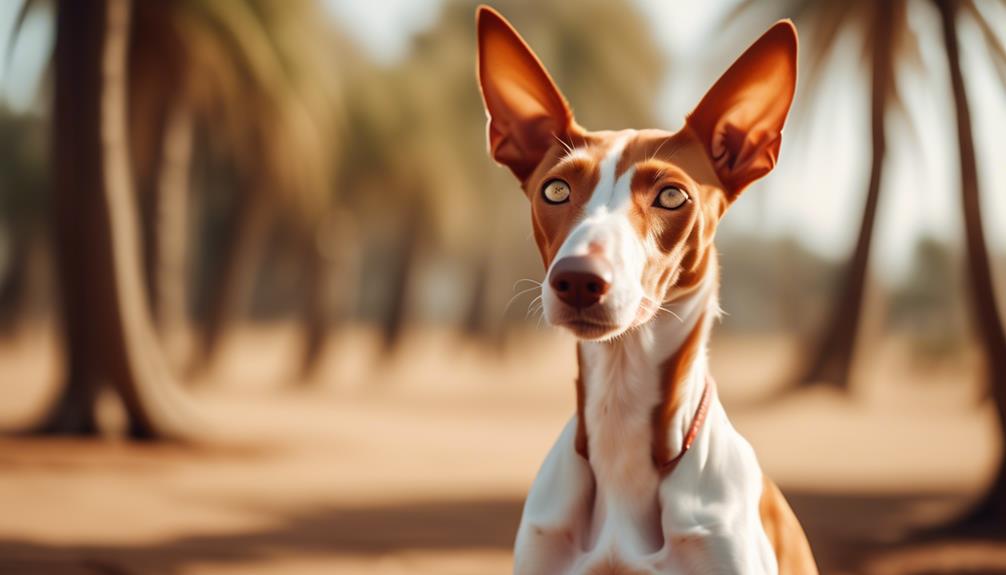
Gentle, affectionate, and loyal, the Ibizan Hound is known for its intelligent and easy-to-train nature. These dogs are highly adaptable and make wonderful family pets. They're even-tempered and get along well with children and other pets, including cats. Although they can be independent and stubborn at times, consistent training and positive reinforcement can help overcome these traits.
With their strong bond to their family, the Ibizan Hound is a loving and devoted companion. They may be reserved with strangers, but should never display shyness or aggression. This breed's friendly and sociable nature makes them poor guard dogs, as they're more likely to greet strangers with a wagging tail rather than suspicion.
Activity Level and Exercise Needs
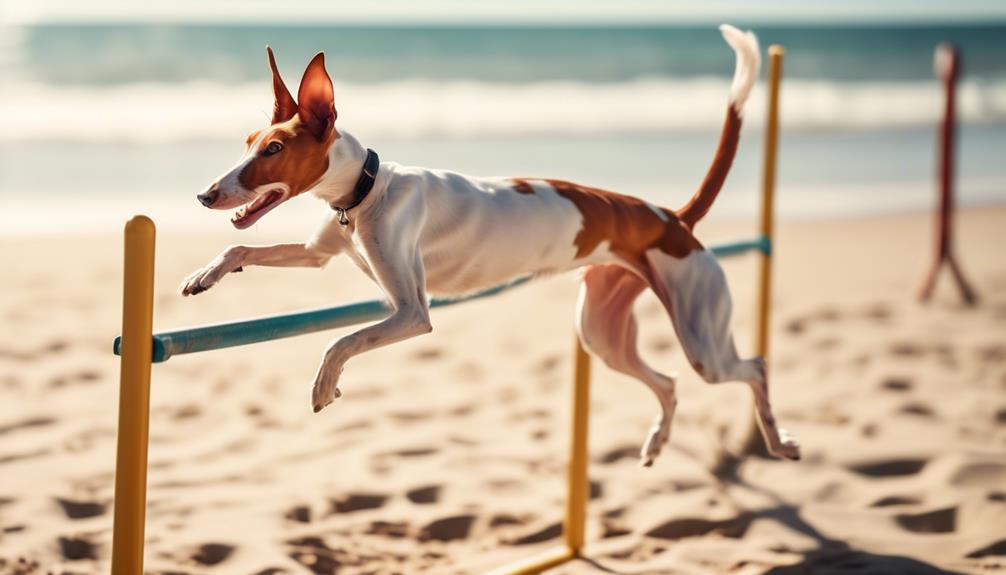
After discussing the temperament and personality of the Ibizan Hound, it's important to address their activity level and exercise needs. The Ibizan Hound is a high-energy breed that requires plenty of exercise to keep them happy and healthy. Here are some key points to note about their activity level and exercise needs:
- The Ibizan Hound is a high-energy dog that loves to run, play, and swim.
- They may not be well-suited for apartment living and need a yard or large area to play in.
Daily exercise is essential for this breed to prevent them from becoming bored or restless. Regular walks or runs, along with ample opportunities to play and explore, are necessary to meet their exercise needs. Mental stimulation, such as puzzle toys or training sessions, can also help keep them engaged and satisfied.
Health and Common Health Issues
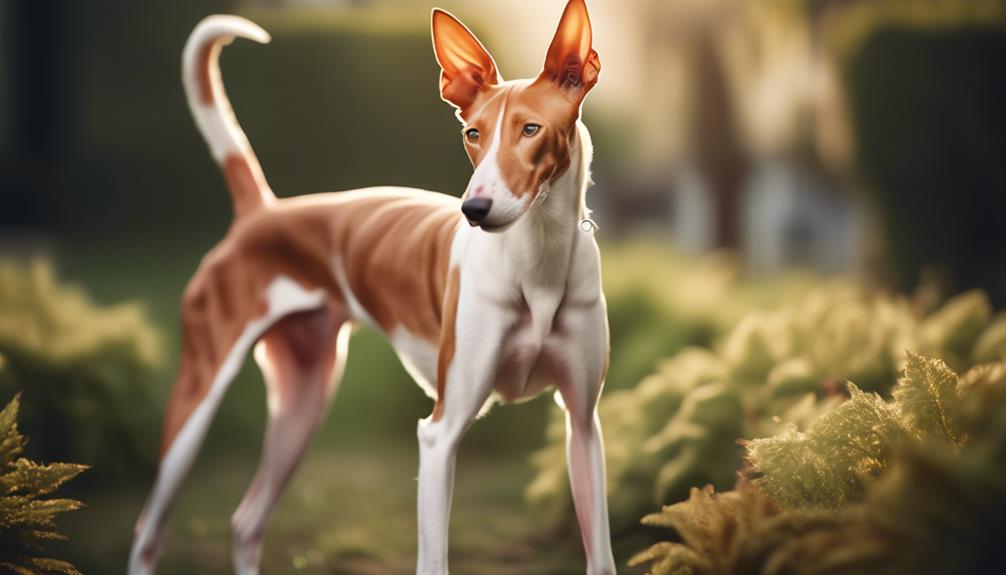
The Ibizan Hound is prone to certain health issues that potential owners should be aware of. While generally a healthy breed, they may be susceptible to a few common health conditions.
One of these is hip dysplasia, a condition where the hip joint doesn't develop properly, leading to pain and discomfort. Eye problems, such as cataracts and progressive retinal atrophy, can also occur in Ibizan Hounds. Allergies, both food-based and environmental, are another health concern for this breed.
It's important for owners to be vigilant and provide proper care, including regular check-ups with a veterinarian, to ensure the overall health and well-being of their Ibizan Hound.
Care and Training
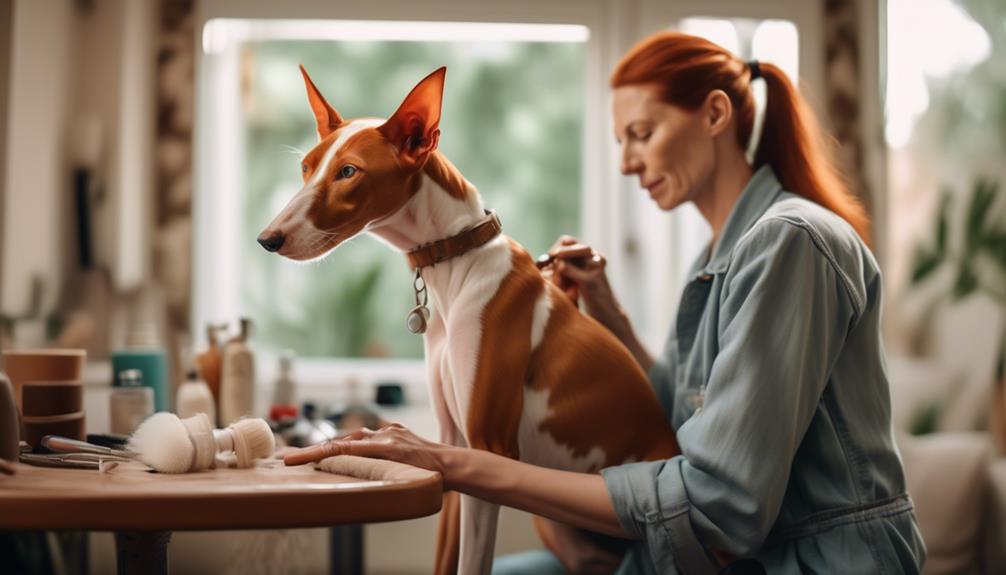
Care and training for the Ibizan Hound breed is essential to ensure their well-being and obedience. These dogs are intelligent and easy to train, but they can also be independent and stubborn. To effectively care for and train an Ibizan Hound, consider the following:
- Provide regular exercise: Ibizan Hounds are high-energy dogs that need plenty of exercise. They love to run, play, and swim, so make sure to provide them with opportunities for physical activity.
- Socialize them early: It's important to socialize Ibizan Hounds from a young age to ensure they're comfortable around people and other animals.
- Use positive reinforcement: Positive reinforcement techniques, such as rewards and praise, work well with Ibizan Hounds. They respond best to gentle and consistent training methods.
- Be patient and consistent: Ibizan Hounds may take some time to grasp commands, so be patient and consistent in your training efforts.
- Seek professional help if needed: If you're struggling with training or behavior issues, consider seeking help from a professional dog trainer or behaviorist. They can provide guidance and support to ensure your Ibizan Hound is well-behaved and happy.
Feeding and Nutrition

To ensure the overall health and well-being of an Ibizan Hound, it's crucial to address their dietary needs and provide proper feeding and nutrition.
The recommended daily amount of high-quality dry food for an Ibizan Hound is 2 to 3 cups, divided into two meals. The specific amount depends on factors such as size, age, metabolism, and activity level.
It's important to measure the food and feed the dog twice a day to maintain a healthy weight. Regularly check the dog's body condition using the eye test and hands-on test to ensure they aren't overweight.
Individual dogs may have different food requirements, so adjust the amount accordingly. Providing a balanced and nutritious diet is essential for their overall health and longevity.
Adaptability and Apartment Living
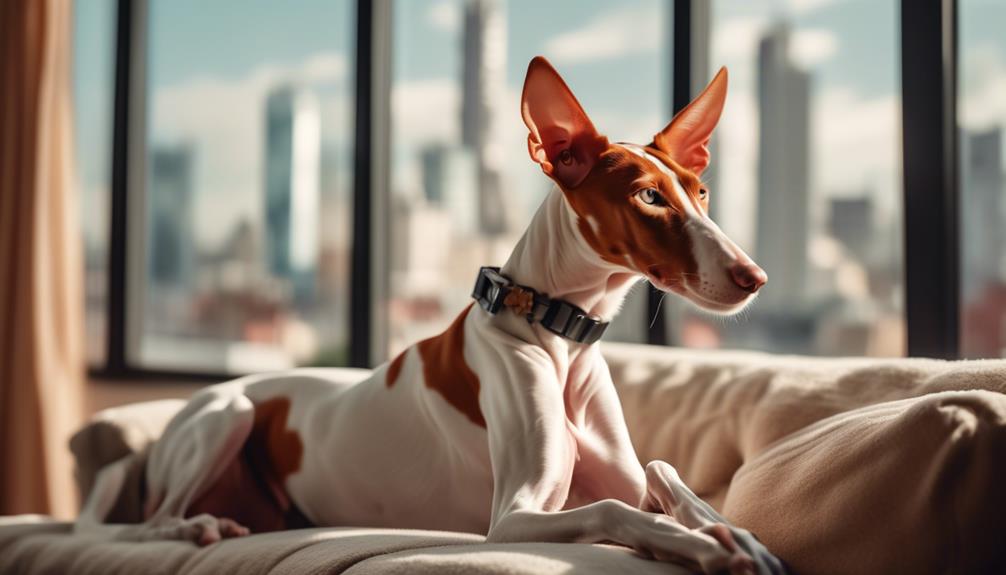
Adapting to apartment living goes beyond just considering the size of a dog; factors such as low barking, low energy, and polite behavior towards neighbors should also be taken into account.
When choosing a dog for an apartment, it's important to prioritize qualities that align with apartment living. Consider energy levels, space requirements, and neighbor comfort. Additionally, dogs with low sensitivity levels are better suited for noisy and chaotic environments.
On the other hand, small dogs with high energy and frequent barking may not be suitable for apartment living. Novice owners may find it easier to handle dogs that are easygoing and more trainable.
Ultimately, choosing a dog that exhibits good manners, is calm indoors, and has a low-energy level is crucial for a harmonious apartment living experience.
Aggression, Barking, and Wanderlust Potential
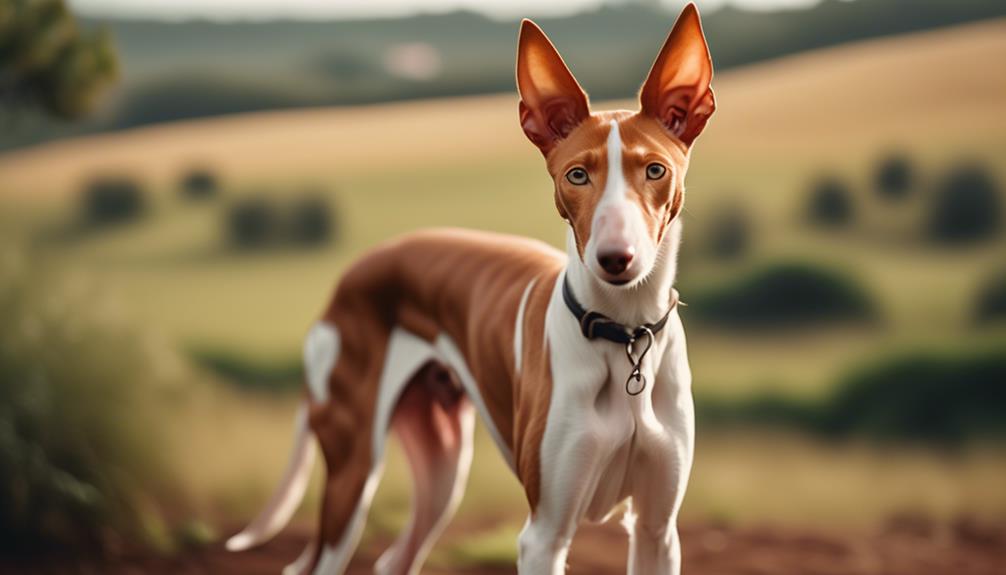
The tendency for aggression, barking, and wanderlust potential varies among different dog breeds. Some breeds are more prone to aggression, while others are known for their calm and friendly nature.
When it comes to barking, some breeds are more vocal than others. Hounds, for example, are known for their howling, which may not be suitable for those living in noise-restricted areas. On the other hand, there are quieter dog breeds that may be a better choice for those living in close proximity to neighbors.
Wanderlust potential also varies among breeds. Nordic dogs, like Siberian Huskies, have a strong instinct to range long distances, while hounds may be prone to following their noses or chasing after small animals.
When choosing a dog, it's important to consider these factors and select a breed that aligns with your lifestyle and living situation.
Frequently Asked Questions
Are Ibizan Hounds Good With Children and Other Pets?
Ibizan hounds are generally good with children and other pets. They have a gentle and affectionate temperament, making them suitable companions. However, early socialization and supervision are important to ensure positive interactions and prevent any potential conflicts.
How Often Should Ibizan Hounds Be Groomed?
Ibizan Hounds should be groomed regularly to maintain their short and smooth coat. Brushing them once or twice a week and bathing them as needed is usually sufficient to keep them clean and healthy.
Do Ibizan Hounds Have a Strong Prey Drive?
Yes, Ibizan Hounds have a strong prey drive. They are attracted to movement and enjoy chasing cats, rabbits, and other animals. Their large, mobile ears indicate their excellent sense of hearing, making them great watchdogs.
Can Ibizan Hounds Be Left Alone for Long Periods of Time?
Ibizan Hounds should not be left alone for long periods of time as they can become anxious or destructive. They are social dogs that thrive on human companionship and need regular interaction and stimulation.
Are Ibizan Hounds Prone to Separation Anxiety?
Ibizan Hounds can be prone to separation anxiety if left alone for long periods of time. It's important to provide them with plenty of mental and physical stimulation, and gradually acclimate them to being alone.
What Are the Similarities and Differences Between Ibizan Hounds and Norwegian Buhunds?
The Ibizan Hound and Norwegian Buhund have distinct characteristics. Both are ancient breeds, but the Ibizan Hound is more slender and elegant, while the Norwegian Buhund is sturdy and robust. They both share a keen intellect and athletic abilities, reflecting their respective norwegian buhund characteristics.
Conclusion
In conclusion, the Ibizan Hound is a graceful and loyal dog breed with a rich history. They're gentle and affectionate, but can also be independent and stubborn.
These high-energy dogs require plenty of exercise and space to roam. While they may not be well-suited for apartment living, they make excellent companions for active individuals or families with larger yards.
With proper care, training, and socialization, the Ibizan Hound can thrive and bring joy to their owners for many years.




